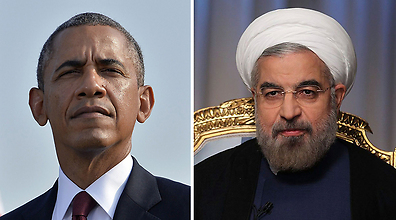Iran’s ultimatum to the West: All or nothing
Ynetnews/Published: 11.24.14,/ Israel Opinion
Analysis: Real reason for deadlock in nuclear talks that Iranians don’t trust Americans in general and President Obama in particular.
There is an almost zero chance that Iran and the world powers will sign a historic agreement on Monday, but the reason for that has nothing to do with the details of the negotiations: Not with the number of centrifuges, not with the number of inspection years and not even with the West’s insistence to get its hands on the Iranian military nuclear project.
The real reason for the deadlock is that the Iranians don’t trust the Americans in general and US President Barack Obama in particular.
So on the eve of concluding the negotiations – after 18 months of talks, during which the Iranians realized that the Americans have a vital interest in reaching an agreement and are willing to pay a lot for it – they raised the ultimate demand, which even the eager Obama administration could not accept: Lifting the sanctions immediately upon signing the agreement.
Obama wants to lift the sanctions gradually, over a few years, both due to the need to examine how serious the Iranians really are and because the Congress will not approve an overall removal of the sanctions.
But the Iranians are holding a mirror to his face and saying: You are demanding that we freeze the situation and accept tight supervision for 10 years – but in three years’ time, when we demand a further ease of the sanctions, you’ll have a different president who might not fulfill the commitment you are giving us today.
Iranian President Hassan Rouhani promised spiritual leader Ali Khamenei and his people a dramatic change in the country’s economy following the removal of the sanctions, but the Iranians don’t believe that the current agreement will lead to an immediate improvement in their situation, and are therefore setting an ultimatum to the West: All or nothing.
During the negotiations, the Americans agreed to everything. There is not a single intelligence agency in the West today which thinks the Iranians don’t have a nuclear military project, but the Americans dropped the demand to receive information and supervise the project.
The Americans also agreed that the Iranians would continue to produce enriched uranium through centrifuges. The only disagreement was over the number: At first, the US agreed to only 1,500 centrifuges, and then went up to 4,500, but the Iranians insisted on keeping everything they had already built – all the 9,000 centrifuges they have.
Then the Americans began inventing patents such as “leave the centrifuges, but just cut off the electricity supply so that we’ll see they are not working.” The Iranians wouldn’t even agree to that.
In order to square the circle, the Americans sent up trial balloons in the form of reports that the Russians or anyone else would produce the fuel rods for the Iranians, but the Iranians thwarted the initiative by turning down the idea.
Washington’s explanation of its generosity towards Tehran was that even an imperfect diplomatic achievement is preferable to a military conflict with harsh results.
The US admits that Iran is just around the corner from producing a nuclear weapon, and that within a year and a half it will be able to arm a nuclear bomb as soon as it decides. But according to the Americans, if this situation can be frozen for at least 10 years through tight supervision – it will be enough. They will rack our brains later as to what to do next. The important thing today is to recruit Iran for the sake of regional stability.
In light of the poor relations between Obama and Prime Minister Benjamin Netanyahu, Israel has almost zero influence on the US on the Iranian issue. The Americans update the Israelis, and opinions are exchanged, but when there is no trust on the political echelon it means nothing.
Israel, however, can see a certain accomplishment in the fact that a permanent agreement has not been achieved, as this has postponed the inevitable conflict between Jerusalem and Washington.
And so once again it has been proven that the American administration has no decisive influence over processes in the region. The Americans will avoid another resounding failure in their foreign policy at any cost, and will therefore make every effort to continue the talks for at least three more months. By then, the Iranian may lower the price. The problem is that the US has nothing left to sell after selling almost everything.




















